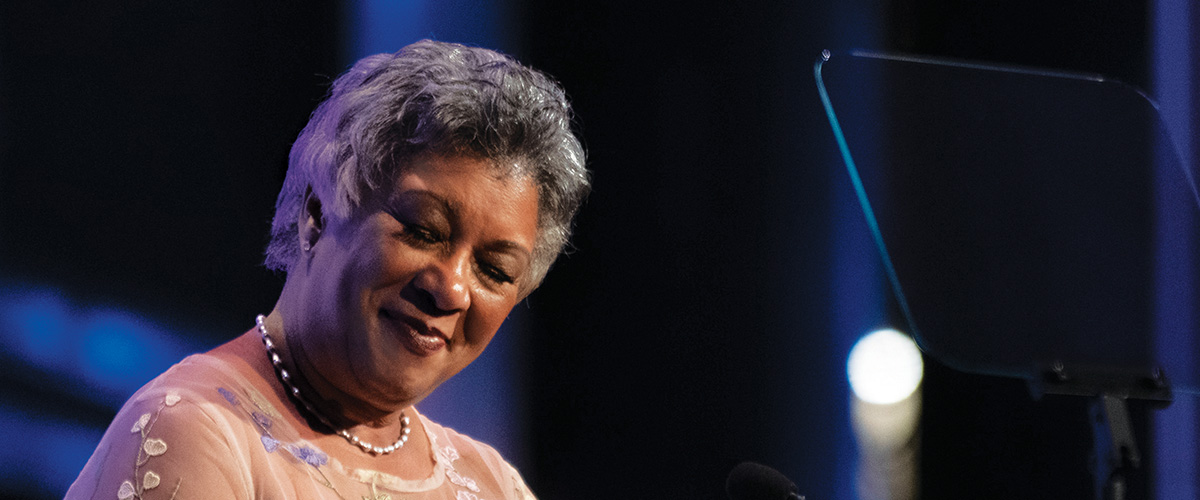Still Trying to Change the World
Alumna Renetta McCann celebrates with six words
It’s no secret that Renetta McCann (Comm78, MS12) is a fan of the six-word memoir—a handful of pithy words crafted to tell a story or sum up a life. In fact, when McCann was inducted into the American Advertising Federation’s Advertising Hall of Fame last year, some of her admirers created a website, filled with such tributes to the trailblazer as “Thanks for lifting as you climb,” and “So glad she’s in my corner.”
McCann, who calls herself a South Side Chicago girl at heart, has spent much of her career as a change agent focused on talent development. After holding many roles at advertising agencies Leo Burnett, Starcom Worldwide, and Publicis Groupe, she returned home to Northwestern to earn a second degree—a master’s in learning and organizational change from the School of Education and Social Policy.
Now chief inclusion experience officer for Publicis, she is also an adjunct lecturer for SESP’s Master’s and Executive Learning and Organizational Change programs, teaching classes such as Designing Organizations and Leading Diversity, Equity, Inclusion, and Justice in Organizations.
“I’m a strategist who works at the intersection of business and people,” McCann explains. “One day someone asked me why I do this type of work. I responded with ‘human potential realized; human progress accelerated’—a six-word story that distills my beliefs.”
McCann’s first job at Leo Burnett, which she got through a campus interview as a senior, led her to the field of advertising media, which has grown exponentially in the decades since. “It fundamentally set me on a path of being a trailblazer for Black professionals in media and general marketing agencies,” she says.
“Eventually I realized I was signing up for something pretty rare.” She went on to become many “firsts” at various companies: the first Black media director, the first Black executive vice president in media, and the first Black female CEO of a global media company.
“Along with doing the work, I was also managing the intangibles of what it means for a Black woman to be doing this work and what possibilities that might create for other Black people,” she says.
McCann, whose children are now adults, also set an example for working women and parents, noting that “it was up to my generation to prove that women could have babies and still produce at the highest professional levels.”
McCann isn’t certain what prompted her fondness for six-word stories, but she does remember picking up the 2008 book Not Quite What I Was Planning: Six-Word Memoirs by Writers Famous and Obscure a few months after it was published. The book was inspired by SMITH magazine, the self-proclaimed home of the six-word story.
“It was a fun, thoughtful, and creative technique to explain really complicated things,” she says. “I realized that if your desire was to really crystallize an idea, this was probably a great mechanism by which to do it.”
––––––
Six-word stories, which are used in schools and as a team-building exercise in corporate settings, have been a staple of the Master’s in Learning and Organizational Change program for more than a decade, says Kimberly Scott, the program’s executive director and associate dean for innovation and program development, who calls McCann a “generative leader of learning and change.”
Introduced to the program by alumna Susan Barrett Kelly (MS11), the story idea is used to help students write personal brand statements, to generate stories about the program, and to succinctly capture the program’s mission of “empowering transformation in organizations through people.”
SESP psychologist Dan McAdams, a professor of human development and social policy, says that asking people to distill their identity into half a dozen words is like his research interviews that tease out how people “make meaning in their lives through story and myth.”
In life story interviews, people describe important chapters, scenes, and characters in their lives. At the end, they try to sum things up by identifying a key theme or motif that runs through the narrative.
Likewise, the six-word story “challenges you to identify something key and central in your narrative identity—a message or important sequence—that can be captured in a pithy expression,” McAdams says, adding that “while it is difficult to utter anything profound in six words, there is something valuable, I think, in getting to the gist in narrative identity.” He says his own story would be “raised daughters, wrote books, loved (his wife) Becky.”
For McCann, six-word stories are entirely different from social media posts. They also “only show up in certain moments,” she says. But they can have a lasting impact. For her induction into the Advertising Hall of Fame, McCann came up with her own six-word memoir: “Still trying to change the world.” “Maybe the way I get to change the world now is by somewhat influencing the next generation of leaders,” she says. “To me, it fits in that six-word story.”
-- By Gayle Worland
